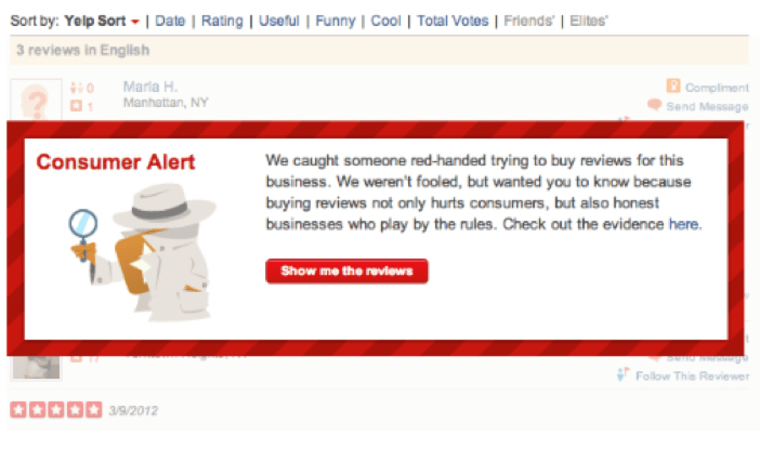User review site Yelp said Thursday it's getting even tougher on reviews it thinks may have been bought and paid for by issuing a "warning" message that will pop up when a review seems "shady."
The site, with more than 60 million visitors monthly, already has a review filter in place to help weed out questionable reviews on everything from local eateries to car repair shops.
"The allure of a page full of five-star reviews can turn even the most ethical business owner starry-eyed and persuade some to attempt to game the system by paying for reviews," Yelp said on its blog. The message continues:
This pretty much breaks every rule in the book, not to mention it’s just wrong to mislead consumers with fake reviews. To combat this, we’ve put on our detective hats, tracked down these rogue solicitations and are now giving you a heads up. Starting today, when we’ve determined that there have been significant attempts to pay for reviews, you may see a warning ... that some shady practices may be at play.
The "consumer alert" message the site's users will see says:
We caught someone red-handed trying to buy reviews for this business. We weren't fooled, but wanted you to know because buying reviews not only hurts consumers, but honest businesses who play by the rules.
"The alert will be removed from the business’s Yelp page after 90 days (unless we uncover any renewed efforts to mislead consumers)," Yelp says.
Fake reviews have been a problem since the Internet commerce began to boom in the 1990s. Amazon.com may be the poster child for them, particularly for book reviews. There's also a healthy cottage industry of websites that sell fake reviews (see video below).
Yelp's visibility — it proudly notes that it has "over 10 million reviews served" — and reputation are at stake. One class-action lawsuit against Yelp, which was dismissed last year, contended Yelp rewarded or punishes businesses based on whether they advertised with Yelp.
In its blog posting Thursday, Yelp said "the large majority of businesses on Yelp play by the rules and work tirelessly to provide the best customer service and products to their clients."
But, "we are not going to let a few bad apples spoil the bunch."
The next step in this weed-out process, Yelp says, will be to "let consumers know if a business has had a large number of reviews submitted from the same Internet Protocol (IP) address, which can be a helpful indicator that they lack authenticity. While the review filter already takes this type of information into account, we believe that consumers also have a right to know if this activity is going on."
Check out Technolog, Gadgetbox, Digital Life and In-Game on Facebook, and on Twitter, follow Suzanne Choney.
